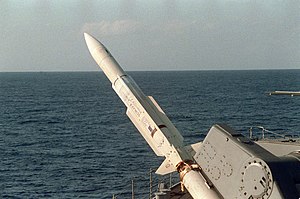RIM-67 Standard
| RIM-67 Standard ER | |
|---|---|
 |
|
| Type | Extended range surface-to-air missile with anti-ship capability |
| Place of origin | United States |
| Service history | |
| In service | RIM-67B: 1981, RIM-156A: 1999 |
| Production history | |
| Unit cost | $409,000 |
| Specifications | |
| Weight | 2,980 lb (1,350 kg) |
| Length | 26.2 ft (8.0 m) |
| Warhead | Proximity fuse, high explosive 137 lb (62 kg) continuous rod, later blast fragmentation |
|
|
|
| Engine | Two-stage, solid-fuel rocket; sustainer motor and booster motor |
| Wingspan | 5 ft 2 in (1.57 m) |
|
Operational
range |
65–100 nmi (120–185 km) |
| Flight ceiling | 80,200 ft (24,400 m) |
| Speed | classified |
|
Guidance
system |
Inertial/SARH |
|
Launch
platform |
Surface Ship |
The RIM-67 Standard ER (SM-1ER/SM-2ER) is an extended range surface-to-air missile (SAM) and anti ship missile originally developed for the United States Navy (USN). The RIM-67 was developed as a replacement for the RIM-8 Talos, a 1950s system deployed on a variety of USN ships, and eventually replaced the RIM-2 Terrier as well since it was of a similar size and fitted existing Terrier launchers and magazines. The RIM-66 Standard MR was essentially the same missile without the booster stage, designed to replace the RIM-24 Tartar. The RIM-66/67 series thus became the US Navy's universal SAM system, hence the "Standard Missile" moniker.
The RIM-67A (SM-1ER Block I) was the Navy's replacement for RIM-8 Talos missile. Improved technology allowed the RIM-67 to be reduced to the size of the earlier RIM-2 Terrier missile. Existing ships with the Mk86 guided missile fire control system, or "Terrier" were adapted to employ the new missile in place of the older RIM-2 Terrier missile. Ships that switched from the RIM-2 Terrier to the RIM-67A were still referred to as Terrier ships even though they were equipped with the newer missile.
The second generation of Standard missile, the Standard Missile 2, was developed for the Aegis combat system, and New Threat Upgrade program that was planned for existing Terrier and Tartar ships. The destroyer USS Mahan served as the test platform for the development of the CG/SM-2 (ER) missile program project. The principal change over the Standard missile 1 is the introduction of inertial guidance for each phase of the missile's flight except the terminal phase where semi-active homing was retained. This design change was made so that missiles could time share illumination radars and enable equipped ships to defend against saturation missile attacks.
...
Wikipedia
